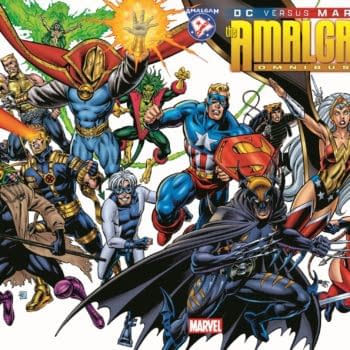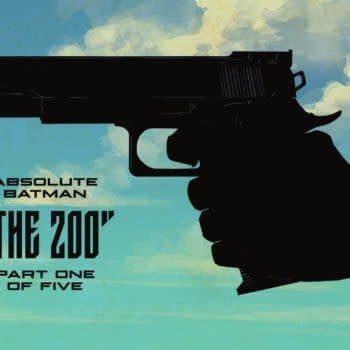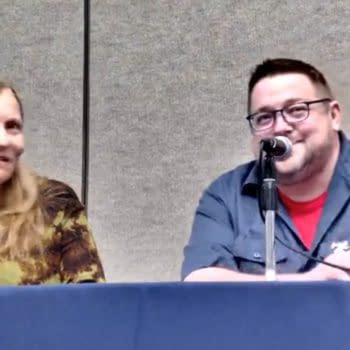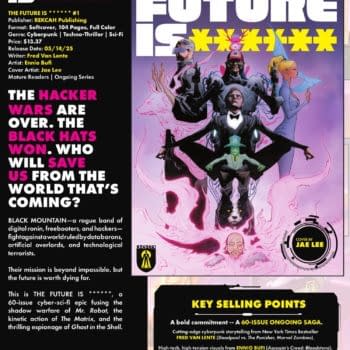Posted in: Recent Updates | Tagged: Alan Moore, jerusalem, lost girls, melinda gebbie
Alan Moore – Building Jerusalem
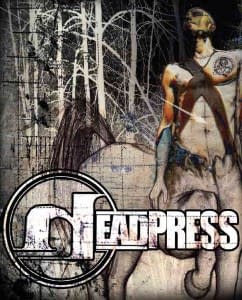
Moore first publicly talked about Jerusalem in a Lying In The Gutters column four years ago, and it's moved on since. At around 500,000 words, or 1500 pages Moore describes the book as dealing with "the area that I grew up in, which is an area in Northampton called The Boroughs" which he reminds us "We're talking about half a square mile of ground here, of dirt."
Moore lists examples of the history covered, and here are a few of them.
"At the end of the street that I was born in, St Andrews Road, there was Castle Station which was formerly Northampton castle which was formerly the castle of bad King John, as mentioned in the opening scene of Shakespeare's King John, therefore it was the castle in which Richard the Lionheart raised the first Crusade, the western world's first major contact with Islam — and we all know how that worked out."
"Oliver Cromwell stayed there the night before he went to Naseby. The War of the Roses was concluded just outside The Boroughs in Cow Meadow."
"Charlie Chaplin began his career in The Boroughs. He was born and raised in Lambeth, as was my grandmother, but he did one of his first performances at the age of seven at the bottom of Gold Street in Northampton, right on the corner of The Boroughs with The Seven Lancashire Lads."
"Thomas Beckett… Northampton Castle was the castle where Henry II invited him, apparently as a gesture of reconciliation, but Henry was selling him out to all of the barons that were baying for his blood and his property, so that was just before Beckett fled the castle and by circuitous route went to Dover and went to France for three years before he was persuaded to come back and got martyred at the abbey…"
"Samuel Beckett, he makes an appearance — Well, he came to Northampton to play cricket, he's mentioned in Wisden for his innings at the county ground, which is just at the bottom of the street where I live now. But fascinatingly, while the rest of the cricket team were out that evening sampling Northampton's other famed attractions, which was drink and prostitutes, apparently Beckett decided that he'd go on a weird nocturnal walk taking in all of Northampton's fantastic churches, because the three oldest churches in the country are in Northampton, two of which are in The Boroughs."
"Lucia Joyce turns up in the book, James Joyce's daughter who was in the mental home next to the school that I was at all the time that I was there. I didn't realise it but she was there for about thirty five years."
But it's not just the famous names and historical events that are filling the book.
"I've been down to visit a couple of the old ladies who I know who still live down The Boroughs, or who used to live down The Boroughs, and I've just got this fantastic material that is unbelievable. Some of the facts I've picked up about this area from the ordinary and extraordinary people that live there."
And Moore doesn't shy away from the modern town, distant from its glory days.
"The Boroughs because it is the red light district in Northampton now, it's an absolute running sore of a neighbourhood, it's always been the poorest neighbourhood in town but there was an incredible sense of community when I was growing up there and that has completely gone. It's a kind of a moral crater, y'know, which is partly what the book's about."
Could Jerusalem, in part, be a very very British version of The Wire? Just with a greater scope and a several textbooks worth of quantum philosophy within? He seems very much to be exploring the idea that every area has a rich history, one that we all seem to ignore or lose interest in, because it's not in the here and now. Moore seems to say, via his own theories of perception of time, after-life, and the realities of quantum mechanics that this is just an illusion.
"There's the bit that I'm doing at the moment, the middle third of the book, reads more like a children's story, but a very adult children's story. It's mainly because it's primarily about children, a gang of dead children running round through the afterlife, a sort of fourth dimensional afterlife for the entire middle third of the book. The writing is quite adult and grown up but the fact that it's about children and from their perspective tends to give it that children's book feel. Meanwhile it's talking about fourth dimensional mathematics and morality and the persistence of events. I'm having a lot of fun with it. It'll be another couple of years before it's done."
Which is, of course, given the age of the interview, while Moore was finishing off Black Dossier, round about now… ish.
This could well be a green and pleasant land…
Headpress 27 can be ordered directly here or through Amazon here. More Headpress work can be found at Headpress.com.






